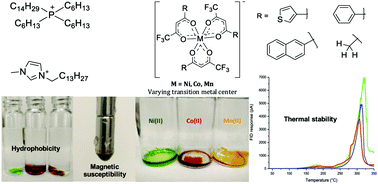Investigating the effect of ligand and cation on the properties of metal fluorinated acetylacetonate based magnetic ionic liquids†
Abstract
Magnetic ionic liquids (MILs) are a subclass of ionic liquids that possess a paramagnetic metal within their chemical structure, making them susceptible to external magnetic fields. A total of twenty-four (24) MILs were prepared and characterized to investigate the effect of the ligand, cation and anion on the physiochemical properties of acetylacetonate-based MILs. It was found that thermal stabilities as high as 260 °C could be achieved by incorporating aromatic moieties in the anion structure. Additionally, the magnetic moment could be modulated by simply changing the transition metal in the anion. Magnetic moment values of 2.8 μB, 4.5 μB and 5.6 μB were obtained by using Ni(II), Co(II), and Mn(II) as the metal centers, respectively. Furthermore, the viscosity of the MILs could be tailored from a few hundred centipoise to several thousand centipoise, increasing their potential applications in numerous interdisciplinary fields. Moreover, the MILs synthesized in this study were found to be insoluble in water at a MIL-to-solvent ratio of 0.01% (w/v), making them potentially useful in targeted separations, where very hydrophobic solvents are highly desired.



 Please wait while we load your content...
Please wait while we load your content...